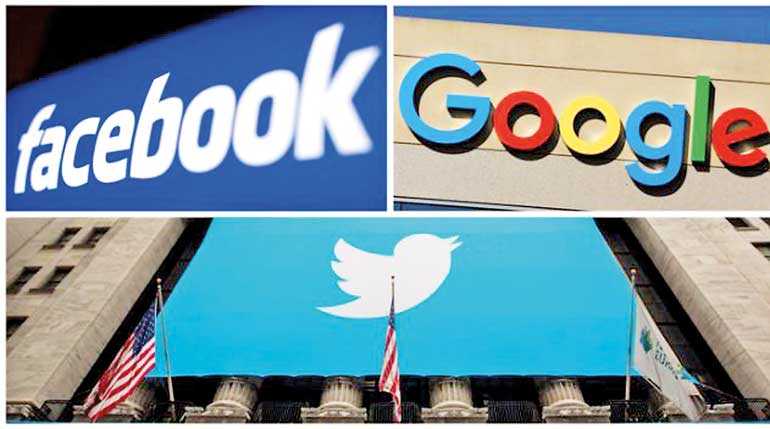Thursday Feb 19, 2026
Thursday Feb 19, 2026
Tuesday, 28 January 2020 00:01 - - {{hitsCtrl.values.hits}}

A combination photo from files of Facebook Google and Twitter logos
NEW DELHI (Reuters): Indian enforcement agencies should be able to break end-to-end encryption to hunt down distributors of child pornography online, a parliamentary panel has urged as the south Asian nation looks to regulate social media.
The panel met officials of companies such as Google, Twitter, Facebook and WhatsApp before preparing Saturday’s report, which will be considered by several ministries in drafting future policies and law.
“It is a challenge to our collective conscience,” the panel said in the 21-page report reviewed by Reuters, referring to child pornography online.
It sought the “breaking of end-to-end encryption to trace distributors of child pornography”, saying India should require that the originator or sender of such messages be traced once law enforcement becomes aware of the sharing of such content.
The call comes as India finalises other rules to force social media giants to deploy automated tools against unlawful content, fanning industry fears that more regulation could boost compliance requirements.
Facebook’s WhatsApp has already been at odds with the government, which has been pushing it to reveal the originators of messages on its platform, amid reports that rumours spread via WhatsApp have led to mob lynchings in recent years.
WhatsApp, which counts India as its biggest market with more than 400 million users, says it provides end-to-end encryption to help protect user privacy, and messages cannot be deciphered by the company or others.
“If a company offers breaking such encryption for child porn, then it will be asked by all agencies,” an industry source who sought anonymity said of the panel recommendation. “It’s like opening secure borders.”
Between 1998 and 2017, about 3.8 million reports of online child sexual abuse imagery originated from India, the world’s highest such figure, says the U.S. National Center for Missing and Exploited Children.
The panel also recommended mandating Internet service providers to “proactively” monitor, remove and report such content to the authorities. Online search websites should also block searches for child pornography sites, it added.
Adult sections denying entry to underage children should also be incorporated into streaming platforms such as Netflix and social media platforms like Twitter and Facebook, the panel added.